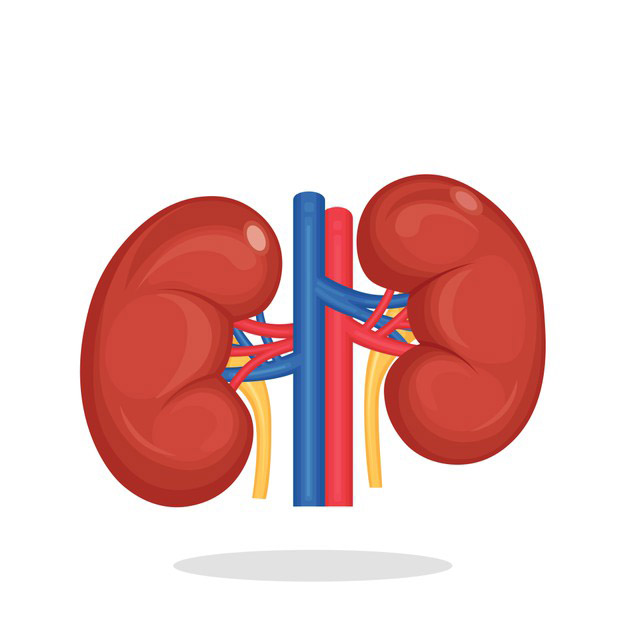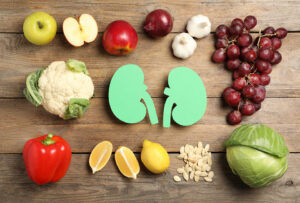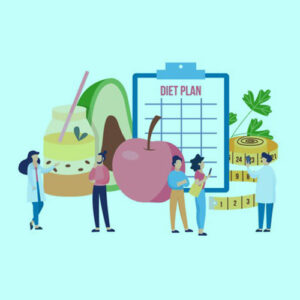Kidney Diseases
What are Kidney Diseases
The kidneys are One pair of bean-shaped organs in the abdomen. The kidneys remove waste and extra water from the blood (as urine) and help keep chemicals (such as sodium, potassium, and calcium) balanced in the body. The kidneys also make hormones that help control blood pressure and stimulate bone marrow to make red blood cells. Each kidney is about the size of a fist.
Healthy kidneys:
- Keep a balance of water and minerals (such as sodium, potassium and phosphorus) in your blood
- Remove waste from your blood after digestion, muscle activity, and exposure to chemicals or medications
- Make renin, which your body uses to help manage your blood pressure
- Make a chemical called erythropoietin, which prompts your body to make red blood cells
- Make an active form of vitamin D, needed for bone health and other things
Your kidneys also make hormones that help;
- control your blood pressure
- make red blood cells
- keep your bones strong and healthy
A wide range of kidney lesions are characterized by a slow, steady decline in renal function. A number of the diseases discussed earlier lead to kidney failure in some patients, whereas other patients have a benign course without loss of renal function. The manifestations of kidney disease are direct consequences of the portions of the urinary tract system most affected.
These manifestations include glomerular diseases; acute renal failure (ARF); tubular defects; end-stage renal disease (ESRD); and renal stones. Objectives of nutritional care depend on the abnormality being treated.
Chronic Kidney Disease (CKD)
The term chronic kidney disease refers as lasting damage to the kidneys that can get worse over time. If the damage is not treated timely, your kidneys may stop working.
The followings are that may increase your risk for CKD include:
- Diabetes
- High blood pressure (hypertension)
- Heart disease
- Having a family member with kidney disease
- Being African-American, Hispanic, Native American or Asian
- Being over 60 years old
If your kidneys stop working suddenly (acute kidney failure), you may experience one or more of the following symptoms:
- Abdominal (belly) pain
- Back pain
- Diarrhea
- Fever
- Nosebleeds
- Rash
- Vomiting
Kidney Failure (ESRD)
Kidney failure, also called end-stage renal disease (ESRD), is the last stage of Chronic Kidney Disease. In most cases, kidney failure is caused by other health problems that have done permanent damage to your kidneys over time. Kidney failure is the last stage of chronic kidney disease; this is why kidney failure is also called end-stage renal disease or ESRD.
Diabetes is the most common cause of ESRD; High blood pressure is the second.
Other problems that can cause kidney failure include:
- Autoimmune diseases, such as lupusand IgA nephropathy
- Genetic diseases (diseases you are born with), such as polycystic kidney disease
- Nephrotic syndrome
- Urinary tract problems
Need to consult?
Quickly Book an Appointment.

How to prevent Kidney Disease?
Living a healthy lifestyle can help prevent diabetes, high blood pressure and kidney disease, or help keep them under control.
Follow these tips to lower your risk for kidney disease and the problems that cause it:
- Control your blood sugar if you have diabetes.
- Keep a healthy blood pressure.
- Keep a healthy weight.
- Follow a low-salt, low-fat diet
- Exercise at least 30 minutes on most days of the week
- Have regular check-ups with your doctor
- Do not smoke or use tobacco
- Limit alcohol
- Talk to your doctor about medicines that can help protect your kidneys
- Get in touch with a renal nutritionist who can chart a plan as per your conditions
Kidney-friendly diet for CKD
You need to have a kidney-friendly meal plan when you have chronic kidney disease (CKD). Watching what you eat and drink will help you stay healthier. A kidney-friendly diet may also help to protect your kidney from further damage by limiting certain foods to prevent the minerals in those foods from building up in your body.
How Food & Wellness can help you?
With Food‘n’Wellness, you can really understand what each nutrient means for people with kidney disease, and how much of these nutrients affect your kidney health. Learn what healthy eating means for people in every stage of kidney disease, including those on dialysis or living with a kidney transplant. Kidney disease management greatly benefits from a tailored kidney disease diet and guidance from a registered dietitian for kidney disease. This specialized approach empowers individuals to make informed choices, controlling protein, potassium, phosphorus, and sodium intake. A kidney-friendly diet helps regulate blood pressure, maintain proper electrolyte balance, and slow disease progression. Additionally, promoting a balanced diet rich in nutrient-dense foods enhances overall well-being. Emphasizing the significance of food & wellness, especially under the guidance of a registered dietitian, fosters improved kidney function and a higher quality of life for those dealing with kidney disease.
Moreover, we operate not just in Kolkata, Delhi, Bangalore, or Mumbai but also in Dubai and Singapore.

Let's get started with treating your condition...
At Food & Wellness we believe that every individual is different and needs special attention. We adapt our programme to your existing lifestyle and try not to change anything drastically so you can easily transition. Over a period of time we ensure results and help you restore your health.
Kidney Diseases Articles

Top 5 Kidney-Friendly Foods You Should Add to Your Diet
Maintaining optimal kidney health is essential as the kidneys play a crucial role in filtering waste, balancing fluids, and regulating blood pressure. A kidney-friendly diet can help prevent kidney damage and slow the progression of chronic kidney disease (CKD). In this article, we highlight five kidney-healthy foods and their specific benefits to help support your kidney function.

Limit the consumption of these 4 unhealthy snacks!
Junk food is defined as “any food, which is low in essential nutrients and high in everything else – calories and sodium”. Junk foods contain little or no proteins, vitamins or minerals but are rich in salt, sugar, fats and are high in energy (calories). Junk food is popular because it is tasty; but it is unhealthy. It is low in fiber, high in fat, and sugar in liquid form. Studies have shown that despite being unhealthy, junk food induces gorging that leads to obesity.

When do we consult a Nutritionist & Dietitian
You’re overweight but healthy.
If you’re technically overweight, but your physician says you’re healthy, the question is: How do you feel about yourself? If you’re happy with the way you look and feel, then don’t call a dietitian. But if you’re not happy with your image in the mirror, consider calling someone who can help you lose weight in a healthy manner.

